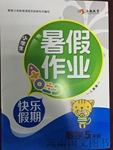题目内容
By the end of last term, we ___ more than 2000 English words.
- A.had learned
- B.have learned
- C.learned
- D.have been learned

 永乾教育寒假作业快乐假期延边人民出版社系列答案
永乾教育寒假作业快乐假期延边人民出版社系列答案Several recent studies have found that being randomly (随机地) assigned to a roommate of another race can lead to increased tolerance but also to a greater likelihood (可能性)of conflict.
Recent reports found that lodging with a student of a different race may decrease prejudice and force students to engage in more ethnically diverse friendships.
An Ohio State University study also found that black students living with a white roommate saw higher academic success throughout their college careers. Researchers believe this may be caused by social pressure.
In a New York Times article, Sam Boakye – the only black student on his freshman year floor -said that "if you're surrounded by whites, you have something to prove."
Researchers also observed problems resulting from pairing interracial students in residences.
According to two recent studies, randomly assigned roommates of different races are more likely to experience conflicts so strained that one roommate will move out.
An Indiana University study found that interracial roommates were three times as likely as two white roommates to no longer live together by the end of the semester.
Grace Kao, a professor at Penn said she was not surprised by the findings. "This may be the first time that some of these students have interacted, and lived, with someone of a different race," she said.
At Penn, students are not asked to indicate race when applying for housing.
"One of the great things about freshman housing is that, with some exceptions, the process throws you together randomly," said Undergraduate Assembly chairman Alec Webley. "This is the definition of integration."
"I've experienced roommate conflicts between interracial students that have both broken down stereotypes(模式化形象) and strengthened stereotypes," said one Penn resident advisor (RA). The RA of two years added that while some conflicts "provided more multicultural acceptance and melding (融合)," there were also "jarring cultural resistance."
The RA said that these conflicts have also occurred among roommates of the same race.
Kao said she cautions against forming any generalizations based on any one of the studies, noting that more background characteristics of the students need to be studied and explained.
【小题1】What can we learn from some recent studies?
| A.Conflicts between students of different races are unavoidable. |
| B.Interracial lodging may have diverse outcomes. |
| C.Students of different races are prejudiced against each other. |
| D.Interracial lodging does more harm than good. |
| A.Few white students like sharing a room with a black peer. |
| B.Roommates of different races just don't get along. |
| C.Interracial roommates are more likely to fall out. |
| D.Assigning students' lodging randomly is not a good policy. |
| A.The school randomly assigns roommates without regard to race. |
| B.Students of different races are required to share a room. |
| C.Interracial lodging is arranged by the school for freshmen. |
| D.Lodging is assigned to students of different races without exception. |
| A.Schools should be cautious when making decisions about student lodging. |
| B.Students' racial background should be considered before lodging is assigned. |
| C.Experienced resident advisors should be assigned to handle the problems. |
| D.It is unscientific to make generalizations about it without further study. |